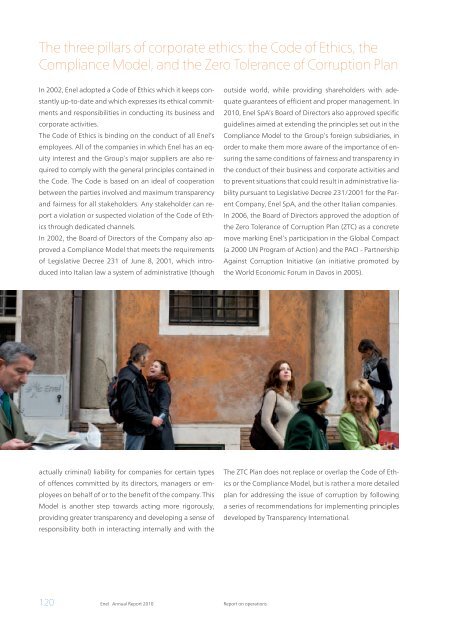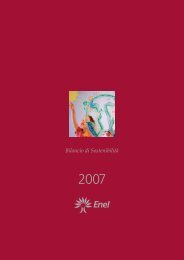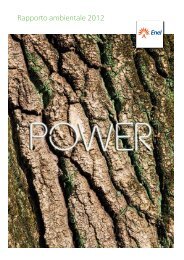Annual Report 2010 - Enel.com
Annual Report 2010 - Enel.com
Annual Report 2010 - Enel.com
You also want an ePaper? Increase the reach of your titles
YUMPU automatically turns print PDFs into web optimized ePapers that Google loves.
The three pillars of corporate ethics: the Code of Ethics, the<br />
Compliance Model, and the Zero Tolerance of Corruption Plan<br />
In 2002, <strong>Enel</strong> adopted a Code of Ethics which it keeps constantly<br />
up-to-date and which expresses its ethical <strong>com</strong>mitments<br />
and responsibilities in conducting its business and<br />
corporate activities.<br />
The Code of Ethics is binding on the conduct of all <strong>Enel</strong>’s<br />
employees. All of the <strong>com</strong>panies in which <strong>Enel</strong> has an equity<br />
interest and the Group’s major suppliers are also required<br />
to <strong>com</strong>ply with the general principles contained in<br />
the Code. The Code is based on an ideal of cooperation<br />
between the parties involved and maximum transparency<br />
and fairness for all stakeholders. Any stakeholder can report<br />
a violation or suspected violation of the Code of Ethics<br />
through dedicated channels.<br />
In 2002, the Board of Directors of the Company also approved<br />
a Compliance Model that meets the requirements<br />
of Legislative Decree 231 of June 8, 2001, which introduced<br />
into Italian law a system of administrative (though<br />
actually criminal) liability for <strong>com</strong>panies for certain types<br />
of offences <strong>com</strong>mitted by its directors, managers or employees<br />
on behalf of or to the benefit of the <strong>com</strong>pany. This<br />
Model is another step towards acting more rigorously,<br />
providing greater transparency and developing a sense of<br />
responsibility both in interacting internally and with the<br />
120 <strong>Enel</strong> <strong>Annual</strong> <strong>Report</strong> <strong>2010</strong> <strong>Report</strong> on operations<br />
outside world, while providing shareholders with adequate<br />
guarantees of efficient and proper management. In<br />
<strong>2010</strong>, <strong>Enel</strong> SpA’s Board of Directors also approved specific<br />
guidelines aimed at extending the principles set out in the<br />
Compliance Model to the Group’s foreign subsidiaries, in<br />
order to make them more aware of the importance of ensuring<br />
the same conditions of fairness and transparency in<br />
the conduct of their business and corporate activities and<br />
to prevent situations that could result in administrative liability<br />
pursuant to Legislative Decree 231/2001 for the Parent<br />
Company, <strong>Enel</strong> SpA, and the other Italian <strong>com</strong>panies.<br />
In 2006, the Board of Directors approved the adoption of<br />
the Zero Tolerance of Corruption Plan (ZTC) as a concrete<br />
move marking <strong>Enel</strong>’s participation in the Global Compact<br />
(a 2000 UN Program of Action) and the PACI - Partnership<br />
Against Corruption Initiative (an initiative promoted by<br />
the World Economic Forum in Davos in 2005).<br />
The ZTC Plan does not replace or overlap the Code of Ethics<br />
or the Compliance Model, but is rather a more detailed<br />
plan for addressing the issue of corruption by following<br />
a series of re<strong>com</strong>mendations for implementing principles<br />
developed by Transparency International.









